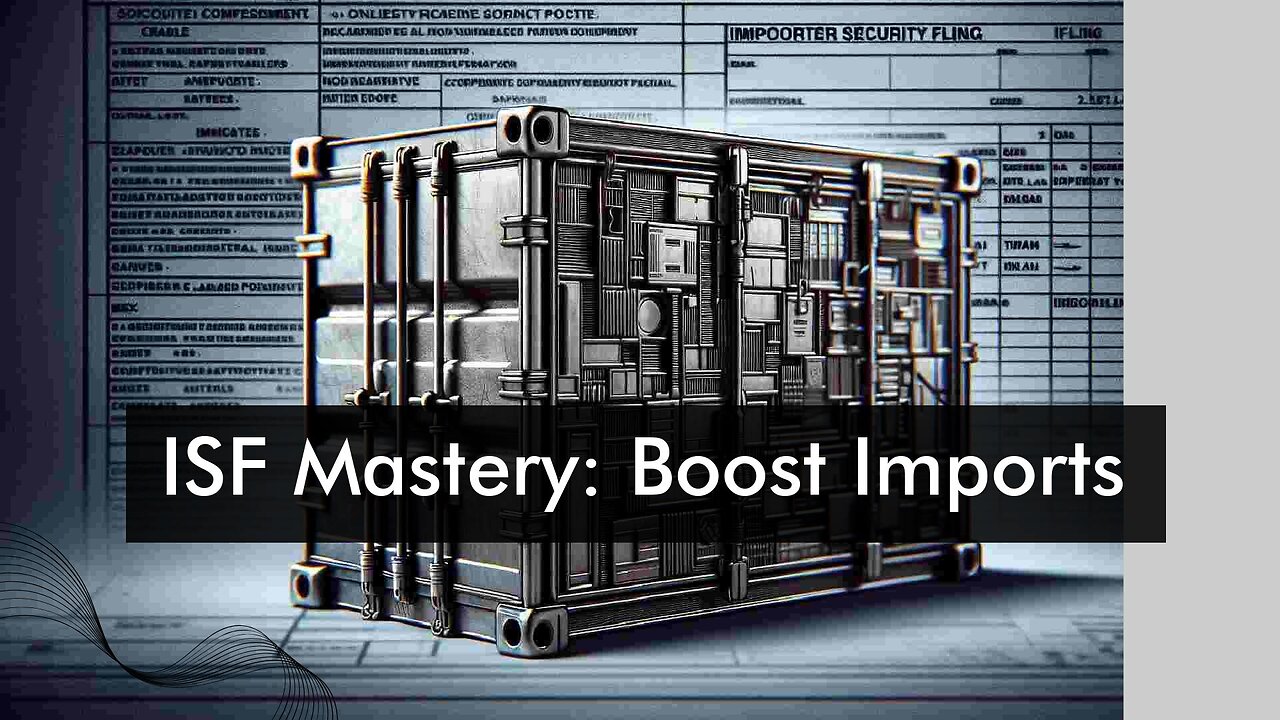Premium Only Content

Mastering ISF Compliance: A Guide for Importers
ISF Filer || isf@isffiler.com || 858-280-9374 || www.isffiler.com
The Importer Security Filing (ISF), also known as the 10+2 Rule, is a mandatory requirement by the US Customs and Border Protection (CBP) for importers to provide specific information about their cargo before it arrives in the United States. This video delves into the concept of ISF, its importance, its impact on customs clearance, and the benefits it offers for importers.
ISF requires importers to submit a comprehensive set of information about their shipment, including details about the importer, consignee, seller, buyer, product description, and the vessel carrying the goods. This information must be submitted electronically to the CBP at least 24 hours before the cargo is loaded onto the vessel at the port of origin.
The importance of ISF lies in its ability to enhance security measures and risk assessment for imported goods. By collecting detailed information in advance, CBP can identify potential security risks and target high-risk shipments more effectively, ensuring the safety of the country by preventing illicit goods, contraband, and potential threats from entering.
Failure to comply with ISF requirements can result in significant delays and penalties. Non-compliance can lead to heavy fines, shipment holds, and even cargo seizure. On the other hand, by submitting accurate and timely ISF filings, importers can streamline the customs clearance process, avoid unnecessary costs and penalties, and ensure smooth transportation of their goods.
ISF is not only a tool for enhancing security but also for managing risk. By providing detailed information about the cargo, importers can proactively address potential issues related to security, transportation, and compliance. This allows importers to plan ahead, make necessary arrangements, and ensure the smooth delivery of their goods.
Complying with ISF requirements offers several benefits for importers. Firstly, it helps importers ensure their compliance with CBP regulations, avoiding penalties and delays. Secondly, ISF allows importers to have better control and visibility over their supply chain. By providing advanced information about their cargo, importers can anticipate any issues or delays and take appropriate action. Additionally, ISF helps importers to build a strong relationship with their customs broker, as accurate and timely data submission is crucial for a seamless customs clearance process.
In conclusion, the Importer Security Filing is indeed a game changer for global imports. Its importance in enhancing security measures, streamlining customs clearance, and helping importers manage risk cannot be overstated. As an importer or customs broker, complying with ISF requirements should be a top priority to ensure smooth and efficient trade operations.
#usimportbond #isfcustomsbroker #uscustomsclearing #isfentry
Video Disclaimer Here: This video is intended for educational purposes and has no affiliation with US government entities.
00:26ISF, or Importer Security Filing, is a mandatory requirement by the U.S. Customs and Border Protection for importers to provide specific information about their cargo before it arrives in the United States.
00:55Importers must submit detailed information electronically to CBP at least 24 hours before the cargo is loaded onto the vessel at the port of origin to comply with ISF requirements.
1:05Complying with ISF not only enhances security measures and risk assessment for imported goods but also helps importers streamline customs clearance, avoid penalties, and build strong relationships with customs brokers.
-
 LIVE
LIVE
StoneMountain64
5 hours ago#1 WARZONE TACTICIAN + New Battlefield Trailer
357 watching -
 LIVE
LIVE
SavageJayGatsby
22 hours agoFirst Rumble Exclusive Stream?! | Let's Play: Prey | $300 Weekly Goal for Spicy Bite Saturday
74 watching -
 LIVE
LIVE
GritsGG
10 hours agoWin Streaking! Most Wins 3485+ 🧠
99 watching -
 LIVE
LIVE
Quite Frankly
5 hours ago"Mixed News, RFK Pull-up Challenge, Calls" ft. J Gulinello 8/28/25
278 watching -
 1:14:52
1:14:52
TheCrucible
2 hours agoThe Extravaganza! EP: 29 (8/28/25)
69.5K7 -
 1:09:58
1:09:58
Kim Iversen
3 hours agoTrans. Russian. Anti-Israel. Anti-Trump. Are You Buying This Story?
18.1K45 -
 1:51:08
1:51:08
Redacted News
3 hours agoEMERGENCY! BILL GATES CULT MEMBERS FOUND PLANTED INSIDE MULTIPLE FEDERAL AGENCIES, RFK FURIOUS
113K77 -
 31:02
31:02
Kimberly Guilfoyle
4 hours agoFull Breaking News Coverage: Live with John Nantz & Steve Moore | Ep250
20.4K12 -
 1:15:19
1:15:19
vivafrei
5 hours agoShameless Politicization of Tragedy! Susan Monarez is OUT! Pritzker is an IDIOT! & MORE!
118K47 -
 9:52
9:52
Tundra Tactical
2 hours agoCracker Meme Review On Tundra Meme Review!!
3.52K